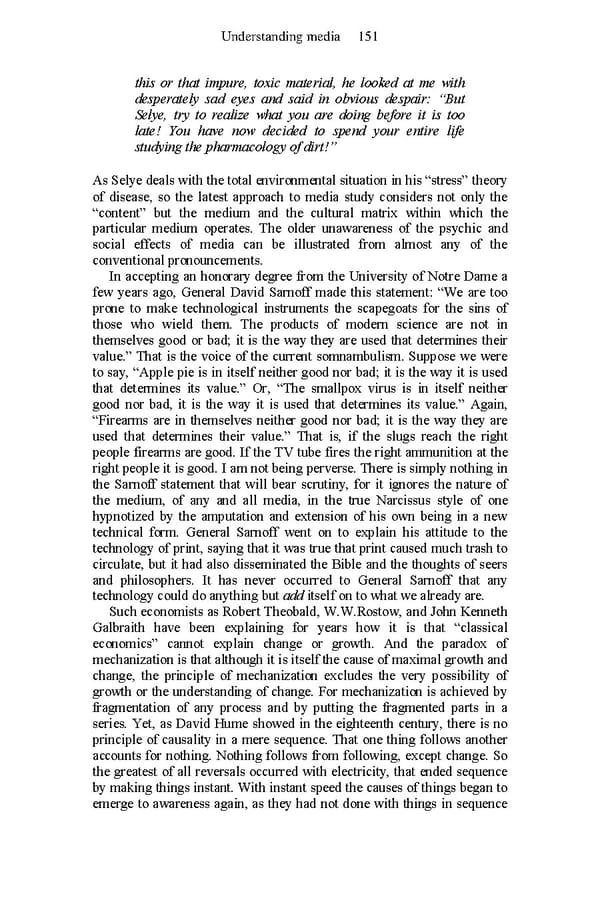Understanding media 151 this or that impure, toxic material, he looked at me with desperately sad eyes and said in obvious despair: “But Selye, try to realize what you are doing before it is too late! You have now decided to spend your entire life studying the pharmacology of dirt!” As Selye deals with the total environmental situation in his “stress” theory of disease, so the latest approach to media study considers not only the “content” but the medium and the cultural matrix within which the particular medium operates. The older unawareness of the psychic and social effects of media can be illustrated from almost any of the conventional pronouncements. In accepting an honorary degree from the University of Notre Dame a few years ago, General David Sarnoff made this statement: “We are too prone to make technological instruments the scapegoats for the sins of those who wield them. The products of modern science are not in themselves good or bad; it is the way they are used that determines their value.” That is the voice of the current somnambulism. Suppose we were to say, “Apple pie is in itself neither good nor bad; it is the way it is used that determines its value.” Or, “The smallpox virus is in itself neither good nor bad, it is the way it is used that determines its value.” Again, “Firearms are in themselves neither good nor bad; it is the way they are used that determines their value.” That is, if the slugs reach the right people firearms are good. If the TV tube fires the right ammunition at the right people it is good. I am not being perverse. There is simply nothing in the Sarnoff statement that will bear scrutiny, for it ignores the nature of the medium, of any and all media, in the true Narcissus style of one hypnotized by the amputation and extension of his own being in a new technical form. General Sarnoff went on to explain his attitude to the technology of print, saying that it was true that print caused much trash to circulate, but it had also disseminated the Bible and the thoughts of seers and philosophers. It has never occurred to General Sarnoff that any technology could do anything but add itself on to what we already are. Such economists as Robert Theobald, W.W.Rostow, and John Kenneth Galbraith have been explaining for years how it is that “classical economics” cannot explain change or growth. And the paradox of mechanization is that although it is itself the cause of maximal growth and change, the principle of mechanization excludes the very possibility of growth or the understanding of change. For mechanization is achieved by fragmentation of any process and by putting the fragmented parts in a series. Yet, as David Hume showed in the eighteenth century, there is no principle of causality in a mere sequence. That one thing follows another accounts for nothing. Nothing follows from following, except change. So the greatest of all reversals occurred with electricity, that ended sequence by making things instant. With instant speed the causes of things began to emerge to awareness again, as they had not done with things in sequence
 Essential McLuhan Page 157 Page 159
Essential McLuhan Page 157 Page 159